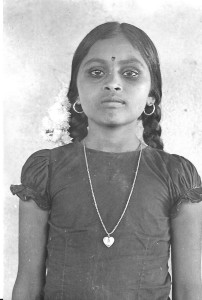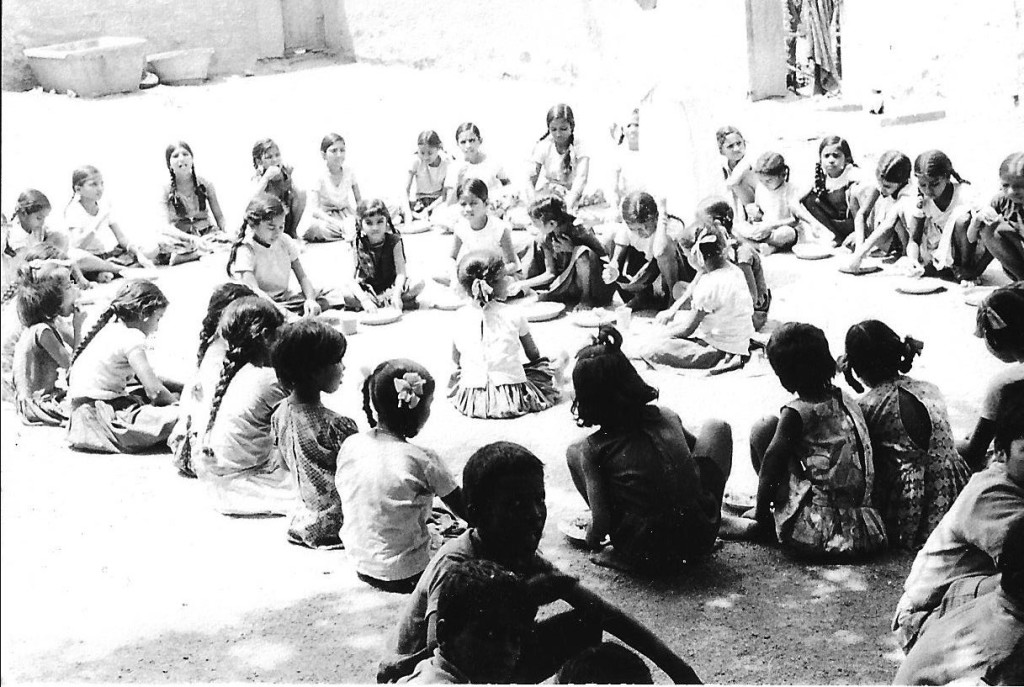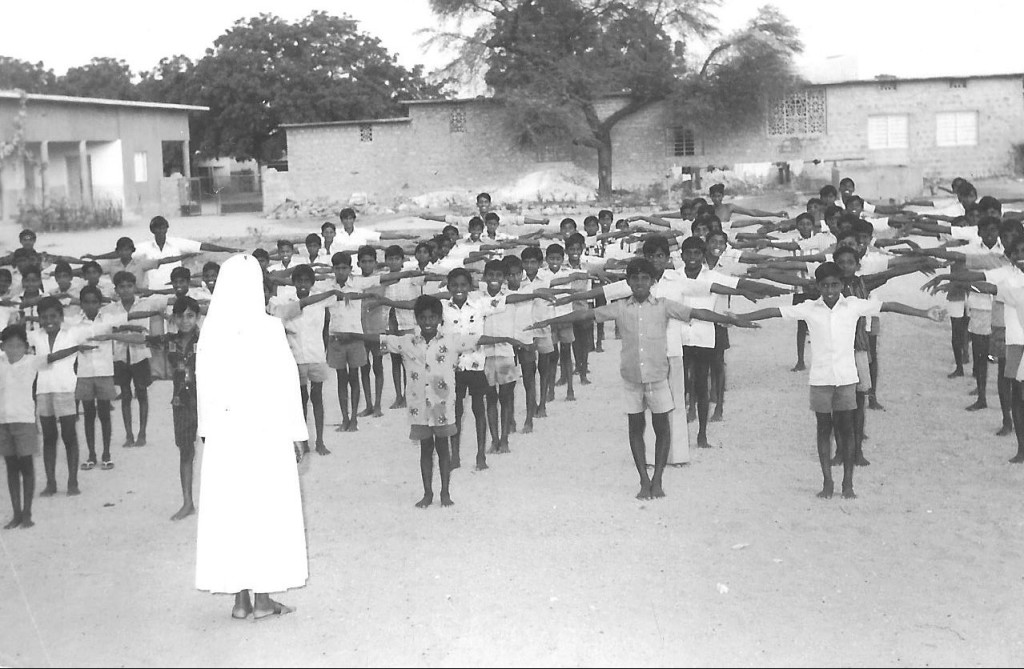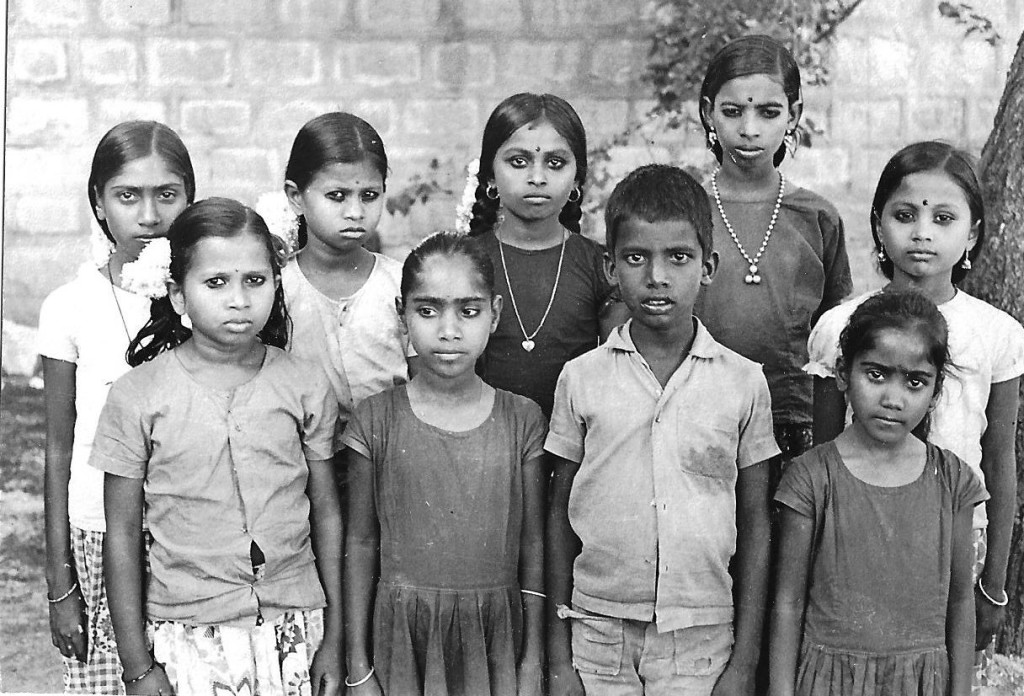Some foreigners working in India created small social islands for themselves. They would not really meet ordinary people, except those who served them: cooks, maids or gardeners. My work put me in daily touch with every-day Indian society as it was at the time. Much of it was dominated by poverty. At least one third of the population lived below the poverty line – which had been fixed at having less than one rupee per day to live on. In spite of my own financial limitations, I have tried to help as many people as I could.
At the time, as a Mill Hill Missionary, I received no salary. I was given board and lodging in St John’s Seminary, as I recounted before, and received a monthly allowance of Rs [= Rupees] 100 a month. This was meant to defray the costs of clothing, shoes, soap, petrol for my motor cycle and other small items. In my case, I spent the Rs 100 on paying a salary to the young man I was employing as a personal secretary.
Because I came across so many cases of people who desperately needed help, I approached my family in the Netherlands. With their help I set up a fund through which donations could be channelled from the Netherlands to India. The fund was first known as FOCAP [= ‘Focus on Andhra Pradesh’], managed by Mr A.L.L. Berenbroek, the father of my sister-in-law Hilde Wijngaards-Berenbroek. When FOCAP began to focus on larger projects, a new fund was set up, the St Francis Fund, managed by my brother Drs Aloys Wijngaards and my sister-in-law Drs Nelleke Wijngaards-Serrarens. The fund has helped numerous deserving people over the past 50+ years since we kept the fund going even after I had to leave India myself.
In this chapter I will list some examples based on a report for the year 1974. They show how people could be helped substantially by small donations at the right moment. In describing these cases I will omit the names so as to avoid embarrassment. I had in my files exact reports and receipts for each of these cases.
I want it to go on record that the people we helped were not beggars. Contrary to the impression tourists may get from down-and-outs they meet in some Indian cities, Indians are hardworking and have a profound sense of personal honour. If they promise to repay a loan, they will.
Families struck by misfortune
A poor farmer, with only a small plot of land had lost his two only bullocks. In order to enable him to buy two bullocks with which he could cultivate his land I advanced an interest-free loan of Rs 500/-. The loan was paid back to me after two years.

A girl I was able to help
A factory worker with his wife and only child were living in a very small hut about two meters high and not more than four square meters wide. The plot of the ground surrounding the hut belonged to the man. He and his wife decided to build their own house, but for the bricks, beams and asbestos (!) sheets of the roof they would require a loan. I gave them a loan of Rs 1500/- which they have repaid over the past three years. They repaid the loan by saving part of their earnings (each earns about Rs 3 per day) and partly because of an old debt of Rs 500/- repaid to them by relatives.
At Christmas I helped about ten persons to buy new clothes. The people concerned did not possess any clothes other than what they were wearing, with just one shirt or one pant as reserve. The cost per person was approximately Rs 50/-. These persons were mainly children but among them was also a young lady for whom I bought a sari and another woman for whom I bought a blanket, as she had no blanket and used to sleep every night just in her sari. Impossible to imagine in the chilly nights over Christmas and January!
I helped a villager with a sewing machine so that he could set up a little shop as village tailor.

Girls in a boarding school having their main meal: rise, curry and dhal on tin plates.
Education
Over the past years I have been maintaining the education of seven primary school children in the boarding of Emjala, a village north of Hyderabad. The cost per year per child was approximately Rs 200/-. This was: Rs 165 per person as boarding fee and Rs 35 for other smaller expenses (soap, hair oil, laundry etc.). This particular boarding was really doing a very great service for our poor children. I have seen with my own eyes how much the children benefitted from being away from the small huts in which they lived and from getting some proper training. The boarding, which accommodated 160 children, had only a minimum of facilities. There were no proper bathrooms or toilets. There were no dormitories so that the children always slept in the verandas. The daily food was also poor. The sisters in charge of the boarding only managed by small grants from the government, the diocese and some charitable organizations. The monthly boarding fee demanded from parents (Rs 15) was the absolute minimum and hardly covered the food for six days.
I gave a grant to a student to finish his MEd Degree. The student in question hailed from a poor family and had experienced a lot of personal troubles. One of his relatives, a carpenter, was supporting him for his student hostel fees and expenses for books, etc. When the carpenter fell ill, the student almost had to break off his studies. I gave him Rs 300/- to cover his most immediate expenses. He promised to return the money, if possible, within one or two years.
I gave another person a grant of Rs 250/- to help him in his study as a medical practitioner. This practically meant that the man in question would function as the local chemist in his village. He worked in cooperation with the doctor of a nearby township. The grant was to help him pay the tuition fees, some elementary equipment and the exam fee for the government certificate.

Boys of a larger boarding school doing their morning PT.
Special needs
A boy of twenty-four years who had been out of employment for more than a year, suddenly received a chance of doing a job as a peon, a message carrier in an office. The job was a temporary job only (for two and a half months) and offered only Rs 80/- per month as salary. In the circumstances it was of the utmost importance that the boy would get the job. It would not only help him solve the immediate debts of his family, but might also be the beginning of permanent employment elsewhere. An absolute condition for getting the job was having the white uniform of a messenger boy. I gave him Rs 75/- to acquire this uniform — it just meant two pairs of white cotton pants and shirts.
A factory worker lost a finger during the work. On account of the medical treatment he had to undergo, he could not work for one and a half months. As the fault was technically his own and as he was only a part-time worker, he received no assistance from any insurance scheme. Moreover, he lived far away from his family and without support. So I helped him with Rs 150/- to survive the weeks of unemployment.
In two other emergency cases brought to my notice by a Christian who was a secretary of a workers’ union, I gave help amounting to Rs 75/- each.
I knew a girl belonging a good family who was desperately looking for a suitable candidate for marriage. In the family in question, both father and mother were handicapped and incapable of doing any work. The older brother of the girl had been without work for a long time. The family lived from one debt to another. Originally they had belonged to a small farming community, but on account of drought in their area they had moved to Hyderabad five years before. The girl and her parents were very anxious that she should be married within her own caste and within the social standard of life to which they originally belonged. But according to prevailing practice the girl could not get a suitable candidate for marriage unless her father could provide her a dowry of at least Rs 1500/-. If she were to marry without dowry, it meant marrying a husband of very doubtful qualities, that is, of bad reputation or totally inept. The dowry system could not be ignored unfortunately because the other families from which the husband had to come, faced their own problem: the dowry received by a son was in fact essential to guarantee a good marriage for one of his sisters. Among well-to-do farmers the dowry could go up to as high as Rs 40,000/- or more. I noted at the time that, so far, by lack of funds, I had not been able to help this girl. I felt bad. I knew that she was a deserving case. She herself knew some promising boys who would be willing to marry her, but the families of those boys insisted on receiving a proper dowry.
Often I gave small amounts to people who were in immediate need, either to pay off small debts or to buy the necessary food. Undernourishment and even real starvation among many families were rife. The day-to-day workers often stayed unemployed for weeks. Then they would run up bills in the local grocery shops. After a certain level of debt had been reached, shopkeepers would refuse to help out, even if the family wanted to buy just food enough for one day. The food these people ate was the very, very minimum amount necessary for existence. Mostly it consisted of one meal a day, often made up of inferior grains, not even of rice or wheat.

Children from Ramanthapur village near St John’s Seminary whom I sent for study in various boarding schools
End result
In such cases as the above, small amounts really helped, either to save people from a real emergency or to help them towards securing a better future. In all cases I made a thorough examination, often asking seminarians to check out all the aspects personally. Whenever possible, I asked recipients to pay the money back to me as if it was an interest-free loan. In spite of the amount being rather small in general (one rupee was equivalent to 35 Dutch cents or 10 English pennies) in the course of the months it amounted to large sums.
I am also happy to report that this charity fund increased over the years because of the generosity of my family and friends. In the course of time, grants from it were focused mainly on helping children from poor backgrounds receive a good education. Thousands have been given a new start in life through this scheme. Some boys and girls were enabled to do higher studies and obtain degrees. One of them was ordained a priest.
THE STORY OF MY LIFE
- » FOREWORD
- » Part One. LEARNING TO SURVIVE
- » origins
- » into gaping jaws
- » from the pincers of death
- » my father
- » my mother
- » my rules for survival
- » Part Two. SUBMIT TO CLERICAL DOGMA — OR THINK FOR MYSELF?
- » seeking love
- » learning to think
- » what kind of priest?
- » training for battle
- » clash of minds
- » lessons on the way to India
- » Part Three (1). INDIA - building 'church'
- » St John's Seminary Hyderabad
- » Andhra Pradesh
- » Jyotirmai – spreading light
- » Indian Liturgy
- » Sisters' Formation in Jeevan Jyothi
- » Helping the poor
- » Part Three (2). INDIA – creating media
- » Amruthavani
- » Background to the Gospels
- » Storytelling
- » Bible translation
- » Film on Christ: Karunamayudu
- » The illustrated life of Christ
- » Part Three (3). INDIA - redeeming 'body'
- » spotting the octopus
- » the challenge
- » screwed up sex guru
- » finding God in a partner?
- » my code for sex and love
- » Part Four. MILL HILL SOCIETY
- » My job at Mill Hill
- » The future of missionary societies
- » Recruitment and Formation
- » Returned Missionaries
- » Brothers and Associates
- » Part Five. HOUSETOP LONDON
- » Planning my work
- » Teaching teaching
- » Pakistan
- » Biblical Spirituality
- » Searching God in our modern world
- » ARK2 Christian Television
- » Part Five (2) New Religious Movements
- » Sects & Cults
- » Wisdom from the East?
- » Masters of Deception
- » Part Five (3). VIDEO COURSES
- » Faith formation through video
- » Our Spirituality Courses
- » Walking on Water
- » My Galilee My People
- » Together in My Name
- » I Have No Favourites
- » How to Make Sense of God
- » Part Six (1). RESIGNATION
- » Publicity
- » Preamble
- » Reaction in India
- » Mill Hill responses
- » The Vatican
- » Part 6 (2). JACKIE
- » childhood
- » youth and studies
- » finding God
- » Mission in India
- » Housetop apostolate
- » poetry
- » our marriage
